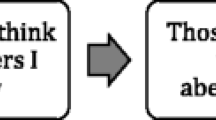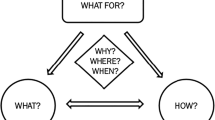Abstract
I introduce and defend an argument against the popular view that anything falling short of knowledge falls short in value. The nature of belief and cognitive psychological research on memory, I claim, support the argument. I also show that not even the most appealing mode of knowledge is distinctively valuable.
Similar content being viewed by others
Notes
When BonJour (2010: 58–61) for example attacks fallibilism, he crucially and without explanation assumes knowledge is the “epistemic summum bonum.” Anything short of it lacks its value. And, for example, when Pritchard (2007: 87) originally names the secondary value problem, he just takes it as a given that there is a problem here to solve. For other value problems concerning knowledge, see Pritchard (2007).
For famous rejection of this traditional view, see Williamson (2000: Chap. 1).
A referee suggests that my slogan here is threatened by a kind of case Kvanvig (2014: 188) discusses, where forming a belief will eliminate one’s evidence for it. You might be in a position to know that you’ve never considered q. But if you form the belief that you’ve never considered q, you’ll thereby consider q, eliminating your evidence for the belief. I think this sort of case interestingly reveals that there are propositions one can be in a position to know, but cannot know. Knowledge requires belief and justification, and in these cases forming belief eliminates justification. Still, I think my conditional about being in a position to know holds: if you would just believe that p (on your justification), then you’d know that p. The cases in question are simply ones where the conditional’s antecedent cannot be satisfied. Since the belief would eliminate its justification, it cannot be formed on its justification. I thank the referee for encouraging reflection here.
Williamson (2000: 95) would strike the parenthetical from my conditional: “If one is in a position to know, and one has done what one is in a position to do to decide whether p is true, then one does know p.” Unfortunately, this attributes knowledge in cases where one ultimately “decides” based on mere desire, bias, fear, etc.
Being in a position to know and dispositional belief have knotted connections with tacit belief, inactive belief, implicit belief, and a disposition to believe. This isn’t the place to unravel the knots.
Cf. Bergmann (2005: 421), Huemer (1999: 356 n. 15) and Moser (1989: Chap. 1). One might deny that dispositional belief requires this. An ordinary subject may have never occurrently believed that she was born after her grandfather. Nonetheless, it seems plausible that she dispositionally believes it. However, it may be more plausible that the subject simply has a disposition to believe she was born after her grandfather—she is all set to believe it—and, strictly speaking, does not yet dispositionally believe it. This option is attractive in part because it prevents an explosion of beliefs. It prevents the ordinary, finite-in-mind subject from counting as believing indefinitely many propositions, such as that she was born after her grandfather had been alive for a minute, that she was born after her grandfather had been alive for a half a minute, that she was born after her grandfather had been alive for a quarter of a minute, etc.
Still, suppose dispositional belief does not require prior occurrent belief. Exactly what does it require, then? The complete answer is far from clear. As a result, there will be cases where something counts as dispositional belief, and cases where something nearly counts as dispositional belief, but we won’t be able to tell which cases are which. The difference will be hard to detect and apparently trivial. It won’t split the cases into groups that seem importantly different, or even relevantly different. If offered to be in one group or the other, we’d have no preference. The difference between dispositionally knowing and being in a position to know, then, can be hard to detect and apparently trivial, tracking no preferences. This supports P1. Thanks to a referee for pressing me to clarify several points here.
Cf. Kvanvig (2003), who claims that knowledge and Gettiered belief differ only in some trivial property that could not explain a difference in their value.
Carter et al. (2013), Fantl and McGrath (2009), Pritchard (2007, 2010), and Williamson (2000), for example, nowhere even implicate that they might have intended such a limit. And Kvanvig’s (2009: 345–6) discussion of the value of knowledge covers the occurrent/dispositional distinction for beliefs, but doesn’t apply it to knowledge; apparently, there’s no need to use that distinction to qualify any evaluation of knowledge.
References
Bergmann, M. (2005). Defeaters and higher-level requirements. The Philosophical Quarterly, 55(220), 419–436.
Bernecker, S. (2008). The metaphysics of memory. Heidelberg: Springer.
BonJour, L. (2010). The myth of knowledge. Philosophical Perspectives, 24(1), 57–83.
Carter, J. A., Jarvis, B., & Rubin, K. (2013). Knowledge and the value of cognitive ability. Synthese, 190(17), 3715–3729.
Conee, E. (2005). The comforts of home. Philosophy and Phenomenological Research, 7(2), 444–451.
David, M., & Warfield, T. A. (2008). Knowledge-closure and skepticism. In Q. Smith (Ed.), Epistemology: New essays. Oxford: Oxford University Press.
DePaul, M. (2009). Ugly analyses and value. In A. Haddock, A. Millar, & D. Pritchard (Eds.), Epistemic value. Oxford: Oxford University Press.
Fantl, J., & McGrath, M. (2009). Knowledge in an uncertain world. Oxford: Oxford University Press.
Frise, M. (2015). Epistemology of memory. In J. Fieser & B. Dowden (Eds.), The Internet Encyclopedia of Philosophy. http://www.iep.utm.edu/epis-mem/.
Frise, M. (manuscript). Eliminating the problem of stored beliefs.
Goldman, A. (2011). Toward a synthesis of reliabilism and evidentialism? or: Evidentialism’s troubles, reliabilism’s rescue package. In T. Dougherty (Ed.), Evidentialism and its discontents. Oxford: Oxford University Press.
Huemer, M. (1999). The problem of memory knowledge. Pacific Philosophical Quarterly, 80(4), 346–357.
Kvanvig, J. (2003). The value of knowledge and the pursuit of understanding. Cambridge: Cambridge University Press.
Kvanvig, J. (2009). Responses to Critics. In A. Haddock, A. Millar, & D. Pritchard (Eds.), Epistemic value. Oxford: Oxford University Press.
Kvanvig, J. (2014). Rationality and reflection: How to think about what to think. Oxford: Oxford University Press.
Michaelian, K. (2011). Generative memory. Philosophical Psychology, 24(3), 323–342.
Moser, P. K. (1989). Knowledge and evidence. Cambridge: Cambridge University Press.
Olsson, E. J. (2007). Reliabilism, stability, and the value of knowledge. American Philosophical Quarterly, 44(4), 343–355.
Pritchard, D. (2007). Recent work on epistemic value. American Philosophical Quarterly, 44(2), 85–110.
Pritchard, D. (2010). Knowledge and understanding. In D. Pritchard, A. Miller, & A. Haddock (Eds.), The nature and value of knowledge: Three investigations. Oxford: Oxford University Press.
Schacter, D. L., & Addis, D. R. (2007). The cognitive neuroscience of constructive memory: Remembering the past and imagining the future. Philosophical Transactions of the Royal Society of London B, 362, 773–786.
Williamson, T. (2000). Knowledge and its limits. Oxford: Oxford University Press.
Acknowledgments
For helpful comments and conversation I thank Earl Conee, Brian Cutter, Trent Dougherty, John Greco, Jon Kvanvig, Jon Matheson, Kevin McCain, Andrew Moon, an anonymous referee, and an audience at the 2015 Southern Epistemology Conference. I wrote this paper while supported by a grant from the Templeton Religious Trust. The views expressed in this paper do not necessarily reflect the views of the Templeton Religious Trust.
Author information
Authors and Affiliations
Corresponding author
Rights and permissions
About this article
Cite this article
Frise, M. No need to know. Philos Stud 174, 391–401 (2017). https://doi.org/10.1007/s11098-016-0688-1
Published:
Issue Date:
DOI: https://doi.org/10.1007/s11098-016-0688-1




